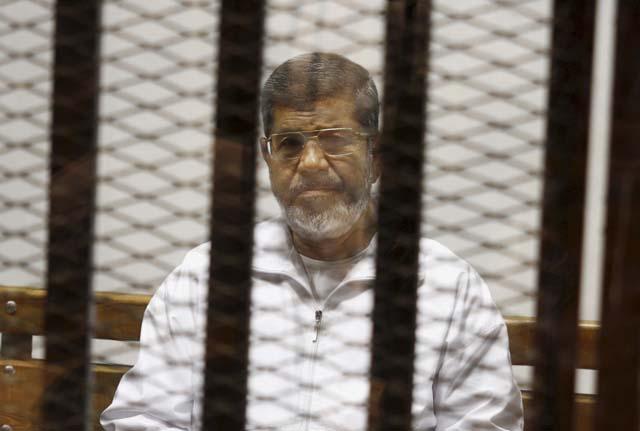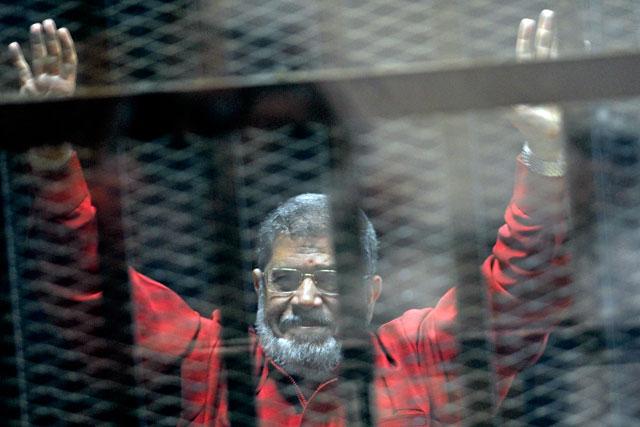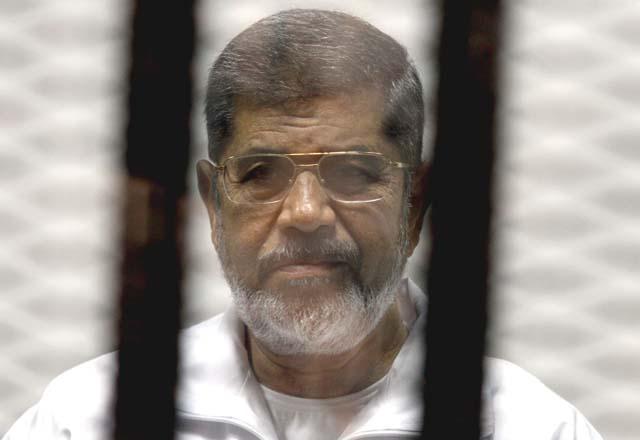You are here
Egypt’s Morsi accused of leaking secrets to Qatar
By AP - Aug 28,2014 - Last updated at Aug 28,2014

CAIRO — Egypt's ousted and jailed Islamist President Mohamed Morsi refused to answer a prosecutor's questions about allegations that he leaked classified documents — some related to the army's budget — to Qatar via the Doha-based Al Jazeera broadcaster, Egypt's official news agency reported Thursday.
If the charges are referred to court, it would be the fourth case under way against Morsi, who was overthrown by the military last summer amid mass protests against his yearlong rule.
According to Egypt's Middle East News Agency, Morsi refused to answer any of the prosecutor's questions during a four-hour interrogation session held inside Borg Al Arab prison, near the Mediterranean city of Alexandria.
Morsi's response to each question was: "I am the legitimate leader," MENA said.
Morsi and other individuals are accused of passing state security files to Qatar, a close ally of his Muslim Brotherhood group, "in a way that harms national security", judicial officials said late Wednesday.
Egypt's General Prosecutor Hisham Barakat ordered Morsi and seven other detainees held for 15 days in reference to the case, the officials said, adding that other suspects remain at large. The officials spoke late Wednesday on condition of anonymity because they are not authorised to talk to reporters.
Morsi already faces charges of conspiring with foreign groups, inciting the murder of his opponents and orchestrating prison breaks during the 2011 uprising that toppled his predecessor, Hosni Mubarak.
Authorities claim to have uncovered a network of top Egyptian officials affiliated with the Muslim Brotherhood, Al Jazeera employees and high-ranking Qatari officials who leaked the information, and tried to smuggle the original documents. Officials said the network intended to sell the original documents to Qatar for $1.5 million.
MENA said some of the documents included information about the army's secretive budget, a sensitive issue in Egypt. It added that Al Jazeera network already aired some of the leaked documents.
The case first came to light in March, when Egypt's Interior Minister Mohammed Ibrahim accused a presidential secretary, Amin El Serafi, of leaking documents from the safes of the presidential palace, and sending copies through his daughter and other Brotherhood members to an Arab country that supports the group, a veiled reference to Qatar. Ibrahim said the suspects aimed to disclose military secrets in order to destabilise Egypt.
He said that after Serafi's arrest, a Palestinian national who later worked as an Al Jazeera producer met with a senior editor for Al Jazeera, who arranged a meeting with top officials in the Arab country. He said a flight attendant belonging to the Brotherhood attempted to transfer the original files outside Egypt.
According to MENA, authorities found the original documents in three large suitcases.
The Muslim Brotherhood won a series of electoral victories after the 2011 uprising that toppled Mubarak, culminating in Morsi's election the following year, when he became the country's first freely elected leader. His year in power proved divisive, however and the military toppled him following massive protests demanding his resignation.
After Morsi was overthrown, authorities launched a sweeping crackdown on his supporters, leaving hundreds killed and tens of thousands in detention, including many senior Brotherhood members.
The group's spiritual leader Mohammed Badie has been sentenced to death and to life in jail, in separate verdicts that could still be appealed. The government designated the Muslim Brotherhood as a terrorist group late last year.
The ouster of the Islamist leader strained relations between Egypt and Qatar, as Cairo accuses the rich Gulf nation and its Al Jazeera network of supporting Morsi and his group. The network has denied accusations of biased reporting.
In June, three Al Jazeera journalists were sentenced to seven to 10 years in prison for promoting or belonging to the Brotherhood and falsifying their coverage of pro-Morsi protests in order to harm Egypt's security.
The trial of the three — Australian Peter Greste, Canadian-Egyptian Mohamed Fahmy and Egyptian Baher Mohammed — was condemned by rights groups as politically motivated.
Related Articles
DUBAI — Regional adversaries Qatar and Egypt have renewed their animosity, trading harshly worded statements over the sentencing to death by
Leaders of Egypt's Muslim Brotherhood group and allied clerics said on Saturday that they are departing Qatar, where they had sought refuge following the ouster of Egypt's Islamist President Mohamed Morsi and the crackdown on his supporters.
Egypt charged ousted president Mohamed Morsi and nine others on Saturday with endangering national security by leaking state secrets and sensitive documents to Qatar, furthering a state crackdown on his outlawed Muslim Brotherhood.

















